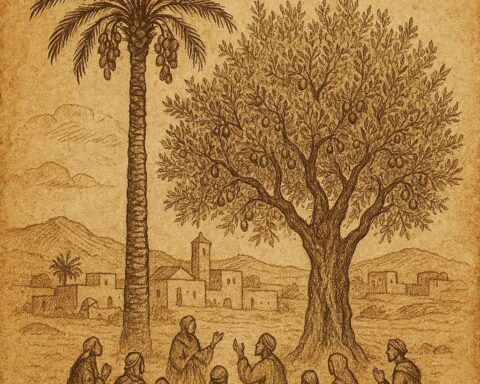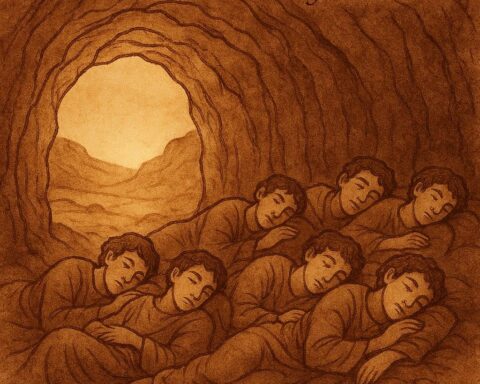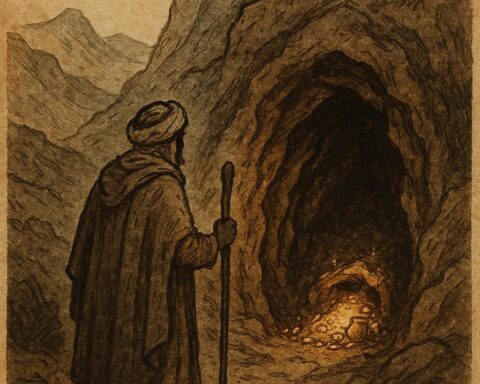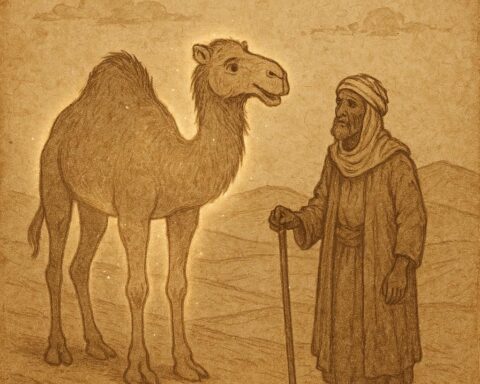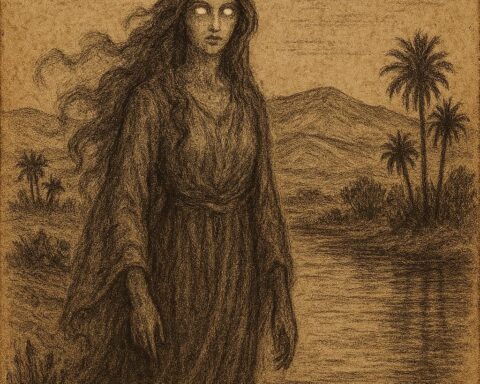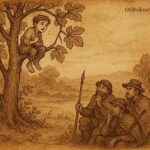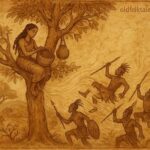In the long-ago days of hardship, when rains failed and famine tightened its grip upon the land, there lived two inseparable companions named Awumbi and Mwawumbi. These men were known across the village as the laziest of all. They never lifted hoes to till the gardens nor bent their backs to plant. Instead, they survived by setting traps in the bush, catching small game, and living from hand to mouth. Carefree in spirit, they chose not to marry, preferring to share everything together, one house, one bed, and one life. If there was a pair whose every word and deed embodied “friendship,” it was surely these two.
But when famine struck, their easy lives crumbled. Nothing sprouted in the gardens. The rivers shrank to trickles. Animals fled in search of water, and those that remained were sick or slaughtered by desperate masters. Awumbi and Mwawumbi set their traps day after day, but no bird or beast was caught. Hunger gnawed at their bellies; time itself seemed dry.
One scorching morning, they set out once again, praying for fortune. The next dawn, they approached their trap with silent, hopeful steps. To their joy, it quivered, something had been caught. They rushed forward and found a hare ensnared. Jubilant, they carried it home.
“You prepare the hare for cooking,” Mwawumbi said, “and I will go fetch water if fortune allows.” He set off into the parched land.
Awumbi waited, his stomach twisting with hunger. Evening shadows lengthened, and still Mwawumbi had not returned. At last, despair overcame him. Unable to resist, Awumbi cooked and ate the hare alone, tossing the bones behind the hut before lying down to feign sleep.
READ: The Hare Who Slew the Python: A Nsenga Folktale (Zambia)
Meanwhile, Mwawumbi had wandered far, too weak to continue. He spent the night beneath a barren tree, gnawing cactus plants for their bitter juice to quench his thirst. By morning he stumbled back with a bundle of cactus, calling out to Awumbi to help cook the hare. Awumbi yawned, pretended surprise, and searched fruitlessly. When the bones were discovered, he pointed at them and said, “A wild dog must have stolen it.” Mwawumbi, weary and disappointed, said nothing. The two drank cactus juice and passed the night in silence.
The following day, they returned to the bush. On their path they found a monkey-fruit tree. Though the fruits were small and unripe, hunger gave them no choice. Awumbi told Mwawumbi to set the trap while he climbed to gather the fruit. He returned with twenty pieces, rejoicing at his good fortune, then slumped against the tree and fell asleep.
Mwawumbi returned to find the pile of fruit and, overcome with greed, ate them all. To cover his guilt, he quickly tied his sleeping friend to the tree with bark cloth, covering his eyes so he could not see the culprit. He filled the empty sack with stones and fruit skins, set it in its place, and ran off. After a time, he returned, calling out, “Awumbi! How many fruits did you gather?”
Awumbi, bound and bewildered, cried, “I gathered many! But look at my plight, come quickly and untie me!”
Feigning shock, Mwawumbi loosened the ties. Awumbi explained, “When I slept, I thought you were playing a prank. But when I called, you did not answer. Some rogue must have done this. I shall never forget this day.” Mwawumbi only nodded and asked about the bag. “The fruits are inside,” said Awumbi, “we will ripen them at home and share.” Mwawumbi hid a smile, carrying the bag of stones as if it were treasure.
On their way back, they saw a lion dragging off a man it had killed. Among the man’s belongings lay a calabash of beer. To men who had starved for weeks, this was an astonishing discovery. They snatched it up and returned to the village, parading their prize. In the village square they drank it openly, boasting. The people whispered: “When there is no food anywhere, how can these lazy men have a calabash of beer?”
When the beer was gone, they brought out drums. Both were skilled drummers, and the drums were said to “talk.” Awumbi beat the rhythms first, and the drums sang:
I ate all the hare,
All the hare, all the hare.
Hearing this hidden confession, Mwawumbi grew angry. He grabbed the drums and played in turn. The rhythms spoke louder still:
I tied him to a tree,
And blinded him with bark;
I went to the bush,
And ate all the fruit.
Hark! Hark! Hark!
Pebbles in the sack,
Let him eat them well!
Thus, the drums betrayed them both, exposing their selfish deeds. Enraged, they nearly turned their arrows upon each other. But the villagers intervened, reminding them that famine drove people to desperation. “Blame the hunger, not each other,” the elders urged. And so, though their trust was bruised, their friendship endured.
Moral Lesson
This folktale reminds us that true friendship is tested in times of scarcity. Hunger and hardship can tempt even the closest companions into betrayal, yet forgiveness and reconciliation are vital for survival. Blaming circumstances instead of destroying bonds allows relationships to endure beyond moments of weakness.
Knowledge Check
- Who were the main characters of the story?
Awumbi and Mwawumbi, two inseparable friends. - Why did the friends struggle during the famine?
They were lazy and relied only on traps, which failed when animals fled. - What did Awumbi do with the hare they caught?
He secretly ate it and lied that a wild dog had taken it. - How did Mwawumbi betray Awumbi at the monkey-fruit tree?
He ate all the fruit, tied Awumbi to the tree, and hid the theft with stones. - What role did the drums play in the story?
They “talked” and revealed each friend’s secret wrongdoing to all. - Which people’s tradition does this story belong to?
The Bemba people of Zambia.
Source: Bemba folktale, Zambia. Collected in Folktales of Zambia (see: Chiman L. Vyas, comp., “Folktales of Zambia” collection).






